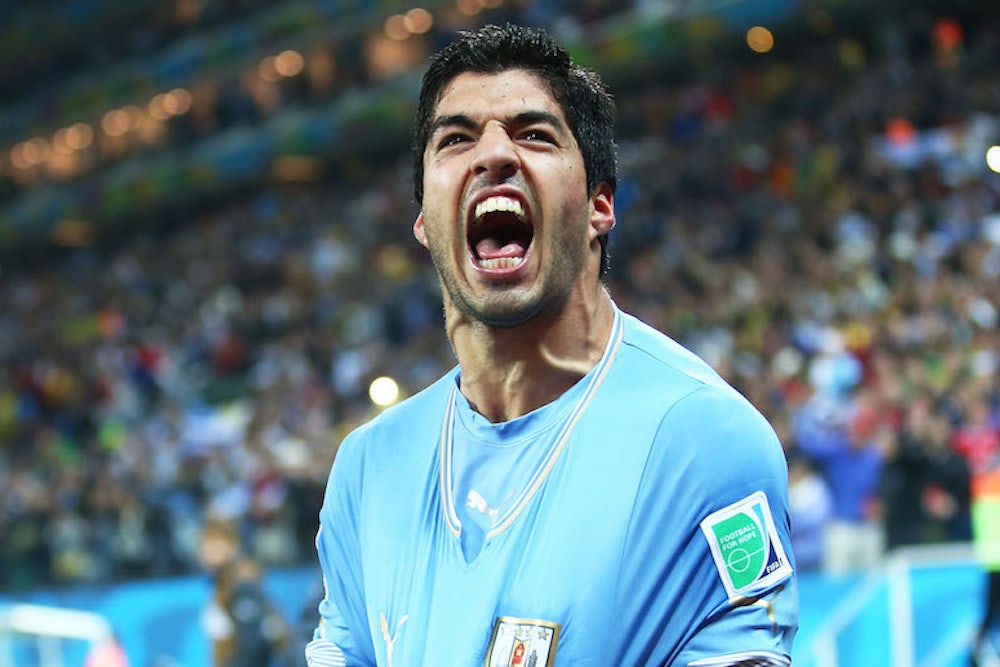Once Uruguay had beaten England to stay in the World Cup, I turned off the TV and exhaled. What a display from Luis Suarez!
It would have been naive to expect anything less. After all, Suarez has shown how decisive he can be at Liverpool. A few days ago, I had a long, rather touching conversation with a Liverpool fan I found walking around Copacabana beach. He spoke of Anfield’s magic, of his love of Dalglish and Gerrard and his almost physical disgust at the sheer mention of Wayne Rooney, born in Liverpool only to torment Liverpool fans, first at Everton and then at Manchester United. But most of all he spoke of Suarez. “The greatest footballer who ever played for us,” he told me, to my astonishment. Surely he was exaggerating, I told him. After all, Suarez has barely been at Anfield for a couple of years. “Not in the least!” he said, not taking my skepticism well. “We have never had anyone attack like that, fight like that. Sometimes I think he was born in my own neighborhood. Suarez is a beast. A beast!”
I don’t know if there’s ever any question about that. In any case, Suarez’s two goals against England should dispel any doubts. What we saw at Arena Corinthians was the display of a very peculiar kind of striker. We might as well follow the taxonomy, because Suarez is a beast indeed.
There are many types of them in the world of football. There are great poachers, of course. Think of Javier Hernandez, who seems to have an intuitive sense of what happens inside the box but gets lost outside of it. Chicharito is always there at close range, but seems to fade when faced with opportunities from afar. Paolo Rossi was, in my opinion, one of the best poachers the World Cup has ever seen: absolutely lethal at close range. Then there are the specialists, men who seem destined to score using mostly one particular skill. Peter Crouch was one. Oliver Bierhoff was another, perhaps even Miroslav Klose, who, among other things, is a master of the header. Then there are the aesthetes, highly accomplished strikers who seem to interpret scoring as an art form. They craft goals and see the back of the net as a canvas. Their power comes from beauty, not violence. Butragueño comes to mind. Perhaps Bebeto and even Van Persie, although he can be brutal when need be.
And then we have the beasts. For them, scoring is a matter of rage. A goal is an explosion, an opportunity to test the goalie’s fear. They dream of shredding the hexagonal threads of the net; putting the ball not in the goal but past it. They are the equivalent of those sluggers who fantasize about hitting a home run way over the green monster and onto the streets of Boston. They are the masters of the slam-dunk; those who seek to tear the hoop and smash the glass. They hit 340-yard drives; 160-mph serves. They are… beastly.
The biggest beast I’ve ever seen was Gabriel Batistuta. The wonderful Argentinean didn’t strike the ball: he punished it. What I remember most about him, apart from his famously massive thighs, was his penalty-taking style. Batistuta took eight or nine steps, ran towards the ball and simply killed it. Pity the keeper who dared touch that thing! I honestly think that, given the right (or wrong) angle of impact, one of Batistuta’s insane kicks could have easily broken a goalie’s wrists. Very few got the chance to prove me wrong: there was simply no way to get there in time. Hristo Stoichkov was also a beast. I painfully remember his goal against Mexico in 1994. Poor Jorge Campos, like a character from the Matrix simply trying to avoid a swerving bullet. The great Ronaldo was a peculiar kind of beast: being Brazilian also forced him to add some panache to his violence; a little ballet before unleashing hell. I could say the same of Van Basten and Cantona, beasts themselves.
Luis Suarez belongs to that band of magnificent executioners. Take a look at his second goal against England. Of course, he needed to strike the ball hard. But there’s a certain extra oomph there. It’s the same fury that has lead him astray before, the same temper that had him bite (!) Ivanovic or (disgustingly) spew out racists slurs against Patrice Evra. It’s the rage of the unpredictable, of the magnetic rabble-rouser—oh, how people react to Suarez at Anfield! It’s Cantona kicking a fan. It’s Roy Keane, or Gennaro Gattuso (not strikers, I know, but beasts nonetheless.) Luis Suarez understands football as a confrontation, against the other team, against opposing fans, against everyone who is not on his side. That’s why, after his goals, he immediately (and instinctively) puts his index finger to his lips and orders the opposing crowd to be quiet. He has scored, but he has also won a bloody fight. You can almost hear him growl: a true beast.
